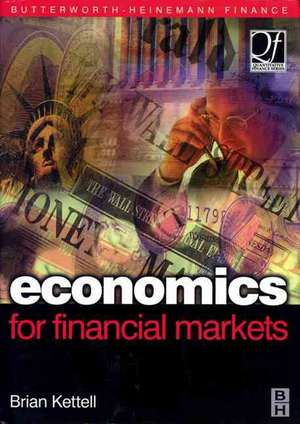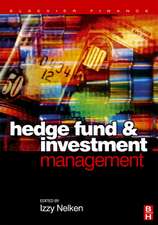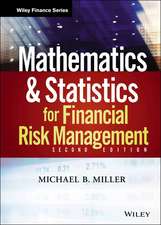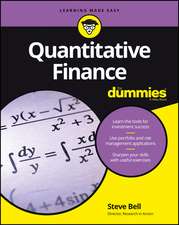Economics for Financial Markets: Quantitative Finance
Autor Brian Kettellen Limba Engleză Hardback – 22 noi 2001
Shows how to distil the vast amount of information in financial markets and identify what is importantDemonstrates how the "New Economy" had changed financial market behaviourExplains how to follow the behaviour of central banks
Din seria Quantitative Finance
- 20%
 Preț: 587.17 lei
Preț: 587.17 lei - 23%
 Preț: 563.55 lei
Preț: 563.55 lei - 45%
 Preț: 608.82 lei
Preț: 608.82 lei - 23%
 Preț: 470.86 lei
Preț: 470.86 lei - 19%
 Preț: 535.54 lei
Preț: 535.54 lei - 23%
 Preț: 576.99 lei
Preț: 576.99 lei - 23%
 Preț: 493.09 lei
Preț: 493.09 lei - 23%
 Preț: 662.93 lei
Preț: 662.93 lei - 8%
 Preț: 423.05 lei
Preț: 423.05 lei - 23%
 Preț: 684.02 lei
Preț: 684.02 lei - 27%
 Preț: 702.59 lei
Preț: 702.59 lei - 27%
 Preț: 735.61 lei
Preț: 735.61 lei - 27%
 Preț: 684.68 lei
Preț: 684.68 lei - 23%
 Preț: 683.40 lei
Preț: 683.40 lei - 23%
 Preț: 672.67 lei
Preț: 672.67 lei
Preț: 536.46 lei
Preț vechi: 725.26 lei
-26% Nou
Puncte Express: 805
Preț estimativ în valută:
102.66€ • 107.05$ • 85.32£
102.66€ • 107.05$ • 85.32£
Carte tipărită la comandă
Preluare comenzi: 021 569.72.76
Specificații
ISBN-13: 9780750653848
ISBN-10: 0750653841
Pagini: 384
Ilustrații: 1
Dimensiuni: 165 x 234 x 29 mm
Greutate: 0.79 kg
Editura: ELSEVIER SCIENCE
Seria Quantitative Finance
ISBN-10: 0750653841
Pagini: 384
Ilustrații: 1
Dimensiuni: 165 x 234 x 29 mm
Greutate: 0.79 kg
Editura: ELSEVIER SCIENCE
Seria Quantitative Finance
Public țintă
Traders; Investment Managers; Risk Managers; Finance Professionals.Cuprins
Macroeconomics and interpretation of financial market volatility?; The time value of money; Term structure of interest rates and financial markets; Forecasting; Business cycles; Economic indicators ; Consumer expenditure, investment spending, government spending and foreign trade:Consumer confidence and consumer sentiment; Global exchange rate system and currency markets; Exchange rate volatility: the Fundamental approach and the asset market approach; US interest rates; Derivatives; The new economic paradigm; Bubbleology and financial markets; Bibliography; Statistical tables; Appendix: useful web addresses.










